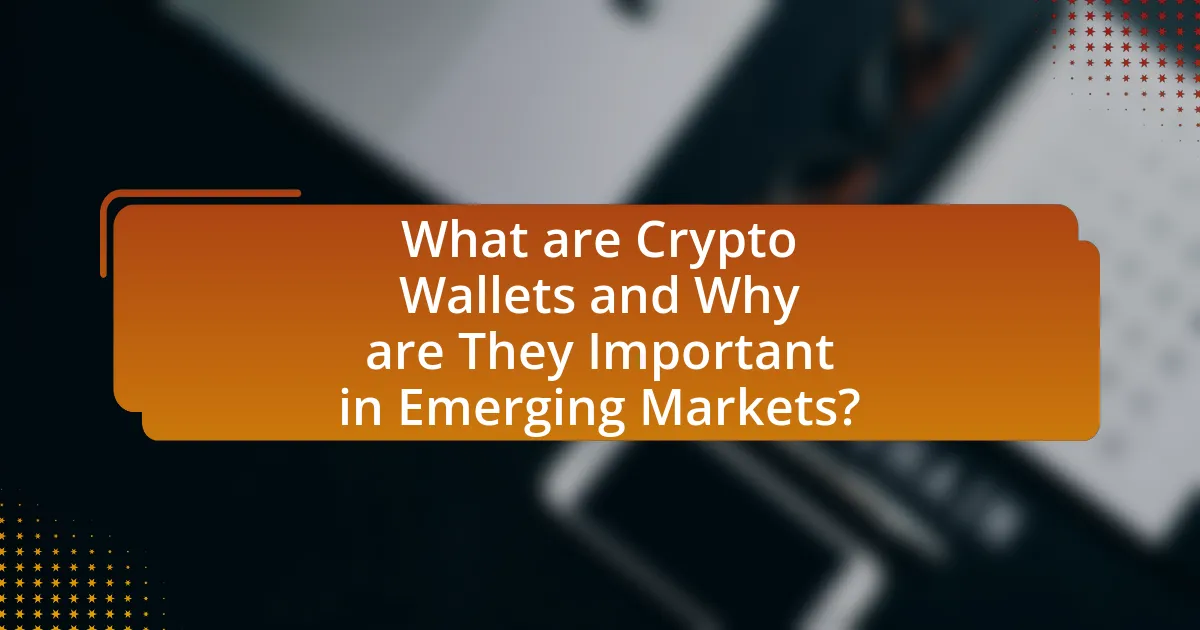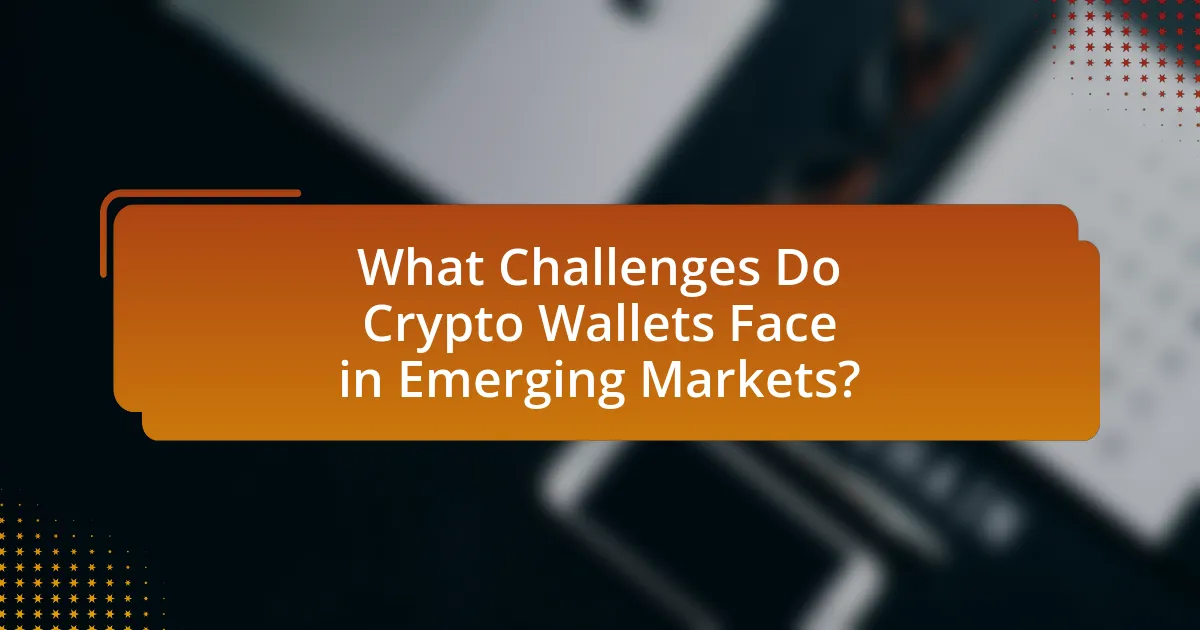Crypto wallets are digital tools essential for storing, managing, and transacting cryptocurrencies, particularly in emerging markets where they promote financial inclusion for unbanked populations. The article examines the significance of crypto wallets in these regions, highlighting their role in overcoming barriers posed by traditional banking systems, mitigating currency volatility, and enhancing economic stability. It discusses the various types of wallets commonly used, the impact of security features on user adoption, and the challenges faced, including regulatory uncertainty and low financial literacy. Additionally, the article explores the influence of government policies, technological advancements, and cultural attitudes on the growth of crypto wallets, providing insights into best practices for users navigating this evolving landscape.

What are Crypto Wallets and Why are They Important in Emerging Markets?
Crypto wallets are digital tools that allow users to store, manage, and transact cryptocurrencies securely. In emerging markets, these wallets are crucial because they provide financial inclusion to unbanked populations, enabling access to digital currencies and decentralized finance. For instance, according to a report by the World Bank, around 1.7 billion adults globally remain unbanked, and crypto wallets can bridge this gap by offering a means to participate in the global economy without traditional banking infrastructure. Additionally, the use of crypto wallets can help mitigate currency volatility and inflation, which are common challenges in many emerging economies, thereby enhancing economic stability and individual financial security.
How do Crypto Wallets function in the context of emerging markets?
Crypto wallets function in emerging markets by providing secure storage and management of digital assets, enabling users to transact in cryptocurrencies without reliance on traditional banking systems. In regions with limited access to banking infrastructure, crypto wallets facilitate financial inclusion by allowing individuals to send, receive, and store money digitally. For instance, a report by Chainalysis in 2021 highlighted that countries like Nigeria and Vietnam saw significant increases in cryptocurrency adoption, with many users leveraging wallets to bypass currency devaluation and inflation. This trend underscores the role of crypto wallets as essential tools for economic empowerment and financial resilience in emerging markets.
What types of crypto wallets are commonly used in these regions?
The types of crypto wallets commonly used in emerging markets include mobile wallets, hardware wallets, and web wallets. Mobile wallets, such as Trust Wallet and Coinomi, are popular due to their accessibility and ease of use on smartphones, which are widely adopted in these regions. Hardware wallets, like Ledger and Trezor, are favored for their enhanced security features, appealing to users who prioritize the safety of their assets. Web wallets, including Coinbase and Binance, provide convenient access to trading and storage but may pose security risks. The increasing adoption of these wallet types is supported by the growing smartphone penetration and internet access in emerging markets, facilitating the use of cryptocurrencies for transactions and investments.
How do security features of crypto wallets impact user adoption?
Security features of crypto wallets significantly enhance user adoption by providing users with confidence in the safety of their assets. When wallets incorporate robust security measures such as two-factor authentication, encryption, and multi-signature capabilities, they reduce the perceived risk of theft and fraud. For instance, a study by Chainalysis in 2021 indicated that 70% of users prioritize security when choosing a crypto wallet, demonstrating that enhanced security features directly correlate with increased user trust and willingness to adopt these technologies. Consequently, as security features improve, user adoption rates in emerging markets rise, facilitating broader acceptance of cryptocurrency as a viable financial tool.
What role do crypto wallets play in financial inclusion in emerging markets?
Crypto wallets facilitate financial inclusion in emerging markets by providing unbanked populations with access to digital financial services. These wallets enable users to store, send, and receive cryptocurrencies without the need for traditional banking infrastructure, which is often lacking in these regions. For instance, a report by the World Bank indicates that over 1.7 billion adults globally remain unbanked, with a significant portion residing in emerging markets. By utilizing crypto wallets, individuals can engage in peer-to-peer transactions, access remittances, and participate in the global economy, thereby overcoming barriers posed by limited banking services. Furthermore, the low transaction fees associated with cryptocurrency transfers make these wallets an attractive alternative for users in areas where high fees from traditional financial institutions can be prohibitive.
How do crypto wallets provide access to financial services for unbanked populations?
Crypto wallets provide access to financial services for unbanked populations by enabling secure, decentralized transactions without the need for traditional banking infrastructure. These digital wallets allow individuals to store, send, and receive cryptocurrencies, which can be accessed via smartphones or computers, thus bypassing the barriers of physical bank branches. According to a report by the World Bank, approximately 1.7 billion adults globally remain unbanked, often due to geographical, economic, or regulatory constraints. Crypto wallets facilitate financial inclusion by offering low-cost transaction fees and instant transfers, making it easier for unbanked individuals to participate in the economy. Furthermore, the use of blockchain technology ensures transparency and security, which can build trust among users who may be skeptical of traditional financial systems.
What are the barriers to using crypto wallets in these markets?
Barriers to using crypto wallets in emerging markets include limited internet access, lack of financial literacy, regulatory uncertainty, and security concerns. Limited internet access affects the ability of users to connect to blockchain networks, with reports indicating that over 3 billion people globally lack reliable internet connectivity. Lack of financial literacy hampers understanding of cryptocurrency and wallet usage, as studies show that many individuals in these markets are unfamiliar with digital finance concepts. Regulatory uncertainty creates hesitance among potential users, as inconsistent regulations can lead to legal risks; for instance, countries like India have fluctuated in their stance on cryptocurrency. Lastly, security concerns, including fears of hacking and fraud, deter users from adopting crypto wallets, with a significant percentage of individuals expressing distrust in digital financial systems.

What Factors are Contributing to the Growth of Crypto Wallets in Emerging Markets?
The growth of crypto wallets in emerging markets is primarily driven by increased smartphone penetration and the need for financial inclusion. As of 2023, over 60% of the population in many emerging economies has access to smartphones, enabling easier access to digital financial services. Additionally, traditional banking systems often exclude large segments of the population, creating a demand for alternative financial solutions like crypto wallets. According to a report by Chainalysis, regions such as Africa and Southeast Asia have seen a surge in crypto adoption, with Africa experiencing a 1200% increase in crypto transactions from 2020 to 2021. This trend highlights the role of crypto wallets in providing accessible financial services to unbanked populations, further fueling their growth in these markets.
How is the regulatory environment influencing the adoption of crypto wallets?
The regulatory environment significantly influences the adoption of crypto wallets by establishing legal frameworks that either encourage or hinder their use. For instance, countries with clear regulations, such as the European Union’s MiCA (Markets in Crypto-Assets) regulation, promote user confidence and institutional investment, leading to increased adoption rates. Conversely, nations with restrictive policies, like China’s ban on cryptocurrency transactions, deter users and limit market growth. This dynamic illustrates that favorable regulations can enhance the legitimacy and accessibility of crypto wallets, while stringent regulations can stifle innovation and user engagement.
What are the key regulations affecting crypto wallets in various emerging markets?
Key regulations affecting crypto wallets in various emerging markets include anti-money laundering (AML) laws, know your customer (KYC) requirements, and taxation policies. For instance, countries like India and Brazil have implemented stringent KYC regulations that require users to verify their identities before accessing crypto wallet services. Additionally, many emerging markets are adopting AML frameworks to prevent illicit activities, which often necessitates reporting transactions above a certain threshold. Taxation policies are also evolving, with nations like South Africa imposing capital gains tax on cryptocurrency transactions, impacting how users manage their crypto wallets. These regulations are crucial as they shape the operational landscape for crypto wallets, influencing user adoption and compliance requirements.
How do government policies impact user trust in crypto wallets?
Government policies significantly impact user trust in crypto wallets by establishing regulatory frameworks that enhance security and transparency. When governments implement clear regulations, such as Know Your Customer (KYC) and Anti-Money Laundering (AML) laws, users feel more secure knowing that there are measures in place to protect their assets and identities. For instance, a survey by the Cambridge Centre for Alternative Finance found that 70% of crypto users in regulated markets expressed higher trust in platforms that comply with government regulations. Conversely, ambiguous or overly restrictive policies can lead to distrust, as users may fear potential government intervention or asset confiscation. Thus, the nature of government policies directly influences user confidence in the safety and legitimacy of crypto wallets.
What technological advancements are driving the growth of crypto wallets?
Technological advancements driving the growth of crypto wallets include enhanced security protocols, user-friendly interfaces, and integration with decentralized finance (DeFi) platforms. Enhanced security protocols, such as multi-signature authentication and biometric verification, significantly reduce the risk of hacks and fraud, making users more confident in adopting crypto wallets. User-friendly interfaces simplify the process of managing cryptocurrencies, attracting a broader audience, particularly in emerging markets where digital literacy varies. Additionally, the integration of crypto wallets with DeFi platforms allows users to access a range of financial services, such as lending and staking, directly from their wallets, further incentivizing their use. These advancements collectively contribute to the increasing adoption and growth of crypto wallets in various regions.
How is mobile technology facilitating the use of crypto wallets?
Mobile technology is facilitating the use of crypto wallets by providing users with easy access to digital currencies through smartphones and applications. The proliferation of mobile devices has enabled individuals in emerging markets to manage their crypto assets conveniently, often without the need for traditional banking infrastructure. For instance, as of 2023, over 5 billion people globally own mobile phones, which allows them to download crypto wallet apps and conduct transactions instantly. This accessibility is crucial in regions where banking services are limited, as mobile technology bridges the gap, enabling financial inclusion and promoting the adoption of cryptocurrencies.
What role does internet accessibility play in the growth of crypto wallets?
Internet accessibility is crucial for the growth of crypto wallets, as it enables users to access blockchain networks and manage their digital assets. In regions with limited internet connectivity, potential users face barriers to engaging with cryptocurrency platforms, which hinders wallet adoption. For instance, a report by the International Telecommunication Union indicates that as of 2021, only 37% of individuals in developing countries had internet access, directly correlating with lower cryptocurrency usage rates. Enhanced internet accessibility facilitates broader participation in the crypto economy, allowing more individuals to create and utilize wallets effectively.

What Challenges Do Crypto Wallets Face in Emerging Markets?
Crypto wallets in emerging markets face significant challenges, including regulatory uncertainty, limited internet access, and low financial literacy. Regulatory uncertainty arises as governments in these regions often lack clear frameworks for cryptocurrency, leading to inconsistent policies that can hinder wallet adoption. Limited internet access affects the ability of users to engage with crypto wallets, as many individuals in emerging markets rely on mobile networks with poor connectivity. Additionally, low financial literacy presents a barrier, as potential users may not fully understand how to use crypto wallets or the risks involved, which can deter them from adopting this technology. These factors collectively impede the growth and usability of crypto wallets in these regions.
What security concerns are associated with crypto wallets in these regions?
Security concerns associated with crypto wallets in emerging markets include susceptibility to hacking, lack of regulatory oversight, and inadequate user education. Hacking incidents have increased, with reports indicating that over $1.9 billion was stolen from crypto exchanges and wallets in 2021 alone, highlighting vulnerabilities. Additionally, many emerging markets lack comprehensive regulations, which can lead to fraudulent schemes and unprotected user assets. Furthermore, users often lack sufficient knowledge about securing their wallets, making them more vulnerable to phishing attacks and scams. These factors collectively contribute to a heightened risk environment for crypto wallet users in these regions.
How do scams and fraud affect user confidence in crypto wallets?
Scams and fraud significantly undermine user confidence in crypto wallets by creating a perception of insecurity and unreliability. When users encounter fraudulent schemes, such as phishing attacks or Ponzi schemes, they often lose not only their funds but also trust in the entire ecosystem of digital wallets. According to a report by Chainalysis, in 2021 alone, over $14 billion was lost to scams in the cryptocurrency space, highlighting the scale of the issue. This loss of funds leads to increased skepticism among potential users, deterring them from adopting crypto wallets and participating in the market. Consequently, the prevalence of scams directly correlates with a decline in user adoption and confidence in crypto wallet technologies.
What measures can be taken to enhance the security of crypto wallets?
To enhance the security of crypto wallets, users should implement multi-factor authentication (MFA), utilize hardware wallets, and regularly update software. Multi-factor authentication adds an extra layer of security by requiring additional verification methods beyond just a password, significantly reducing the risk of unauthorized access. Hardware wallets, which store private keys offline, protect against online threats and hacking attempts, making them a secure option for long-term storage of cryptocurrencies. Regularly updating wallet software ensures that users benefit from the latest security patches and features, addressing vulnerabilities that could be exploited by attackers. These measures collectively strengthen the overall security posture of crypto wallets, safeguarding users’ digital assets.
How do cultural attitudes towards cryptocurrency impact wallet adoption?
Cultural attitudes towards cryptocurrency significantly influence wallet adoption by shaping user trust and perceived utility. In regions where cryptocurrencies are viewed positively, such as in parts of Asia and Africa, there is a higher rate of wallet adoption, driven by the perception of cryptocurrencies as a means for financial inclusion and economic empowerment. For instance, a survey by Statista in 2021 indicated that 40% of respondents in Nigeria expressed a favorable view of cryptocurrencies, correlating with a rapid increase in crypto wallet usage in the country. Conversely, in cultures where cryptocurrencies are met with skepticism or regulatory challenges, such as in some European nations, wallet adoption tends to be lower, reflecting concerns over security and legitimacy. This relationship between cultural attitudes and wallet adoption underscores the importance of local context in the growth of cryptocurrency usage in emerging markets.
What misconceptions exist about crypto wallets in emerging markets?
Misconceptions about crypto wallets in emerging markets include the belief that they are only for tech-savvy individuals and that they are inherently insecure. Many people assume that using a crypto wallet requires advanced technical knowledge, which deters potential users. However, user-friendly wallets have been developed to cater to a broader audience, making them accessible to individuals with varying levels of technical expertise. Additionally, concerns about security stem from high-profile hacks, but reputable wallets implement robust security measures, such as two-factor authentication and encryption, to protect users’ assets. According to a report by Chainalysis, the adoption of crypto wallets in emerging markets has been increasing, indicating a growing understanding and acceptance of their use.
How can education and awareness campaigns improve adoption rates?
Education and awareness campaigns can significantly improve adoption rates of crypto wallets by providing essential knowledge and addressing misconceptions. These campaigns educate potential users about the benefits, security features, and usability of crypto wallets, which can alleviate fears and uncertainties associated with cryptocurrency. For instance, a study by the Cambridge Centre for Alternative Finance found that increased awareness of digital currencies correlates with higher adoption rates, particularly in emerging markets where financial literacy may be lower. By fostering understanding and trust, education and awareness initiatives can lead to increased user engagement and ultimately drive higher adoption rates of crypto wallets.
What are the best practices for using crypto wallets in emerging markets?
The best practices for using crypto wallets in emerging markets include ensuring strong security measures, educating users about wallet types, and promoting regulatory compliance. Strong security measures, such as enabling two-factor authentication and using hardware wallets, protect against theft and hacking, which are prevalent risks in these regions. Educating users about the differences between custodial and non-custodial wallets helps them make informed choices based on their needs and risk tolerance. Additionally, promoting regulatory compliance fosters trust and encourages wider adoption, as seen in countries like Nigeria, where regulatory frameworks have supported the growth of crypto usage.
How can users ensure the security of their crypto wallets?
Users can ensure the security of their crypto wallets by implementing strong security practices such as using hardware wallets, enabling two-factor authentication (2FA), and regularly updating wallet software. Hardware wallets, which store private keys offline, significantly reduce the risk of hacking, as they are less vulnerable to online threats. Enabling 2FA adds an additional layer of security by requiring a second form of verification, making unauthorized access more difficult. Regularly updating wallet software ensures that users benefit from the latest security patches and features, protecting against known vulnerabilities. According to a report by the Blockchain Security Alliance, 90% of successful hacks could have been prevented with these security measures, highlighting their effectiveness in safeguarding crypto assets.
What tips can help new users navigate the crypto wallet landscape effectively?
New users can navigate the crypto wallet landscape effectively by selecting wallets that prioritize security, usability, and compatibility with various cryptocurrencies. Security is paramount; users should choose wallets that offer features like two-factor authentication and private key control. Usability is also crucial; wallets should have intuitive interfaces that simplify transactions and management of assets. Compatibility is important as well; users should ensure their chosen wallet supports the cryptocurrencies they intend to use, as some wallets are limited to specific coins. According to a report by Chainalysis, the adoption of crypto wallets in emerging markets has surged, highlighting the importance of user-friendly and secure options for new entrants in the space.


